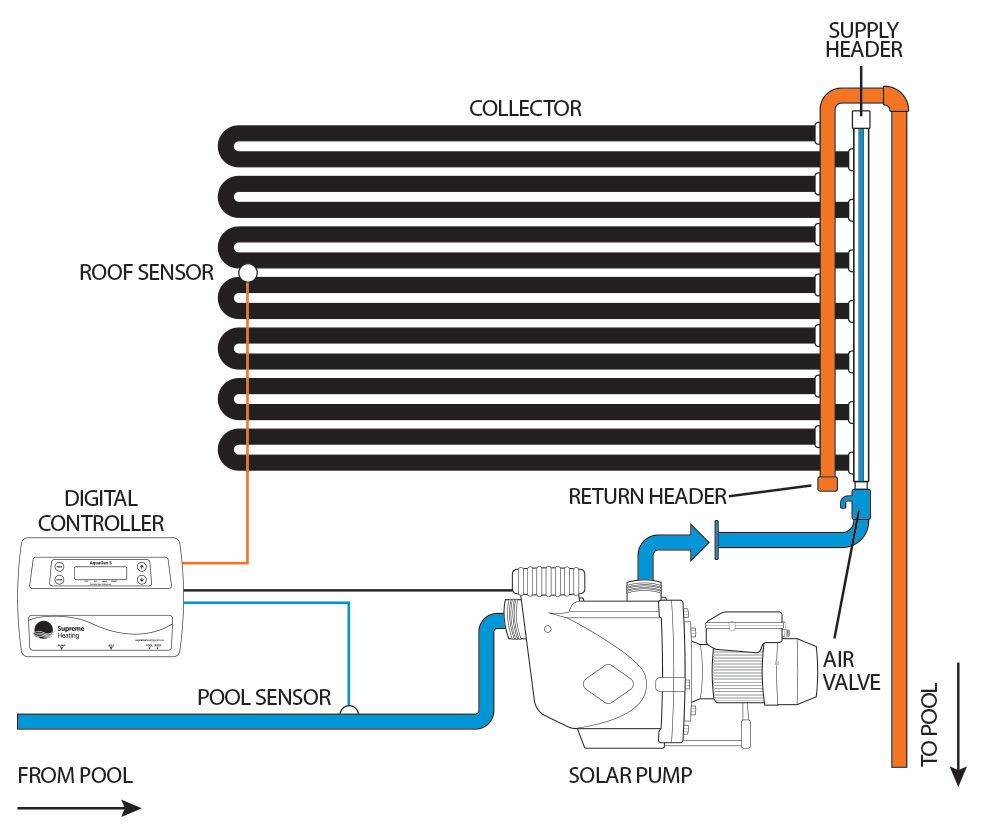You love your pool, but in the winter, it just sits there empty and cold. A pool heater is the answer to this problem! Instead of being a useless slab of concrete, your pool can be a warm oasis for sunbathing or swimming at any time of year.

A swimming pool is a great addition to any home. However, in Australia, a pool heating solution is needed to maximise pool use during colder days or months.
There are various technologies available to heat a pool. The four modern technologies used to heat a pool are:
- Solar Pool Heating
- Pool Heat Pumps
- Gas Pool Heaters
- Pool Covers
Solar pool heating
Solar pool heaters are used to heat pool water in the swimming season and shoulder months (6 to 9 months in Australia). A solar heater is comprised of a solar collector, which collects the sun’s heat and transfers it to the water. The collector may be mounted directly on your roof or placed on an adjacent structure like a veranda or shed.
Solar collectors generally consist of black tubes or panels arranged in a series of loops with water circulating through them. A correctly sized solar pool heating system provides significant amounts of free energy for heating pools throughout the swimming season.
Solar pool heaters are the best way to heat your pool quickly and for free without using fossil fuels or electricity from the grid.

Solar pool heaters circulate the water through black collector tubes where it absorbs the sun’s energy on the roof.
Pool Heat pumps
Heat pumps are more efficient than gas heaters, so they cost you less when it comes to both energy and money. However, they use electricity to heat the pool and are more expensive to run compared to solar pool heating.
Heat pumps have a few other benefits as well. They can be used for both heating and cooling—so if you live in an area where temperatures drop below freezing during the winter months but still get hot during the summer, this could be a good option for you. Heat pumps can also be used with photovoltaic solar panels to lower their heating cost.
The main drawback to heat pumps is that they can be expensive to run compared to solar pool heaters. However, the modern Inverter heat pump technology reduces the running cost by operating the heat pump at a lower capacity to maintain the pool temperature rather than heating it up constantly.
Read our heat pump size calculation guide to learn more about how to choose and size a heat pump.
Gas pool heaters
Gas pool heaters have a quick response time and can heat the pool faster and to higher temperatures compared to electric heat pumps and solar pool heaters. However, gas heaters are more expensive to install and operate. You will see an increase in your utility bill each month by using natural gas instead of electricity as your fuel source.
Gas pool heaters are mainly used for heating spas where faster heating and higher water temperatures are required compared to heating a swimming pool.
If you’re looking for a cheap pool heater that works well and saves you money, an electric model is your best bet.
Pool covers
Pool covers are an important part of keeping your pool warm regardless of which method you use to heat the pool. They keep the water warmer and prevent evaporation, which would make it more difficult to heat the water. In general, pool covers should be kept on your pool for as long as possible each day. This will help keep your costs down by reducing heating requirements as well as maintenance costs and the use of chemicals.
Choosing a pool heater
While heating your pool may seem like an expensive endeavour, it’s worth noting that a pool heater is a must in most climates in Australia if you want to use your pool frequently. To select the best pool heating option, you need to look at:
- whether you want to swim only in the swimming season and shoulder months or year-round,
- the size of your pool,
- initial installation cost of the system, and
- the ongoing heating cost and efficiency of the system.
Based on these questions, you can then choose the best pool heating solution:
- Solar pool heaters are the most cost-effective and faster than heat pumps to heat your pool. They can heat your pool in summer three times faster than a heat pump and for free. However, they can only be used during the swimming season and when the sun’s energy is available.
- Pool heat pumps are more expensive to operate compared to solar pool heaters, however, they are still more efficient than gas pool heaters. They can also be used year-round to heat the pool and for those who want to swim every day or for therapeutic purposes.
- If you have a gas heater, check to see if it has been maintained annually as recommended by the manufacturer. If not, consider replacing it with a newer version electric heat pump that requires less maintenance and is more efficient.
- In all cases, using a pool cover is the best way of minimising the pool heating cost and keeping the pool warm.
Use can also use our Pool Heating Calculator to find your best solution and receive a Free Quote today!




0 Comments